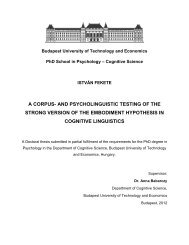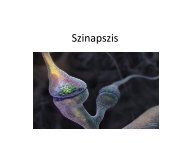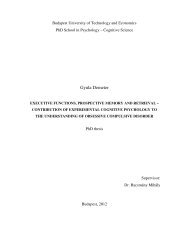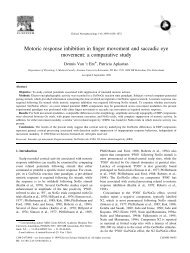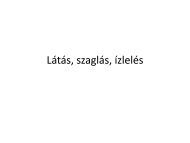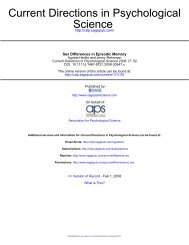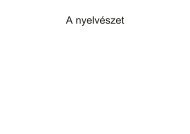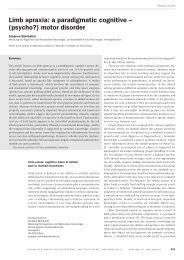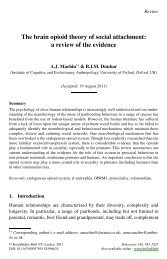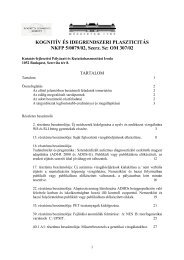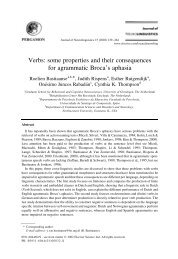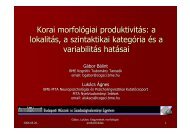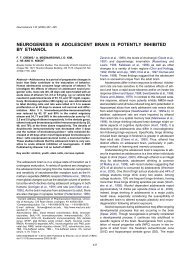Gyula Demeter PhD thesis booklet 1
Gyula Demeter PhD thesis booklet 1
Gyula Demeter PhD thesis booklet 1
You also want an ePaper? Increase the reach of your titles
YUMPU automatically turns print PDFs into web optimized ePapers that Google loves.
2006) in the retrieval practice paradigm the study of item pairs gives<br />
rise to the formation of an episodic memory and the practice phase<br />
establishes a pattern of activation and inhibition over these<br />
memories. On the final recall then this pattern of activation-inhibition<br />
will mediate access to memories. It seems likely that the opportunity<br />
for interference by new memories was greater in our no-sleep than in<br />
our sleep-groups, and, consequently, integration may have been<br />
attenuated in the no-sleep relative to the sleep groups. We can<br />
conclude that the greater degree of integration of memories in the<br />
sleep groups underlies the observed retrieval practice effects.<br />
Thesis IV: No retrieval induced forgetting (RIF) in OCD<br />
OCD patients didn’t show the RIF effect which could not be<br />
explained by working memory deficit or increased anxiety. The lack<br />
of RIF effect might be explained by the dysfunction of conflict<br />
detection processes observed in OCD.<br />
For the cognitive profile of OCD it seems essential the<br />
overactiveted mechanism involved in conflict detection, monitoring<br />
and inhibition of competing information. The OCD patients do not<br />
show the RIF effect, whereas we found similar practice effects in<br />
both the control and the OCD group. According to our findings this is<br />
not affected by the level of anxiety, symptom severity, working and<br />
short term memory capacity.<br />
Contrary to the findings of Koessler, Engler, Riether, and<br />
Kissler (2009) who argue that stress might eliminate RIF in healthy<br />
10<br />
adults by temporary suspending the inhibitory mechanism involved,<br />
we haven’t found relations between RIF and trait or state anxiety<br />
measured by the STAI (State and Trait Anxiety Inventory) in the<br />
OCD group. Aslan and Bäuml (2010) argue that there is a connection<br />
between working memory capacity and RIF. We haven’t found<br />
significant difference between the two groups regarding the hit rates<br />
on the N-back tasks (updating) and on the Digit Span Forward and<br />
Backward Tasks (short term memory span). There was no significant<br />
correlation between RIF and working, short term memory scores in<br />
either of the groups.<br />
The different pattern regarding the recall of NRP- (control<br />
items for Rp- items) and NRP+ in the two groups could mean that the<br />
patients are not sensitive for output interference. Most probably, the<br />
lack of RIF might be explained by the dysfunction of conflict<br />
detection processes observed in OCD maintained by the constant<br />
hyperactivity of anterior cingulated cortex and prefrontal structures.<br />
11



